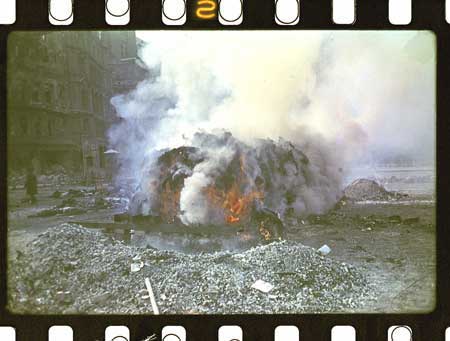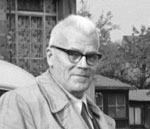| [images and
captions added by this website] 
Friday, December 10, 2004
 DRESDEN
1945: Victims were cremated on huge funeral pyres
for days after the 1945 British
raid. [Original
colour photo by Fritz Hahn, taken on Feb 25, 1945:
copyright assigned to David Irving in all western
countries in 1961]
Neo-Nazis snub
Auschwitz debate From Roger Boyes in Berlin GERMAN politicians joined forces
yesterday to denounce
neo-Nazi
deputies in Saxony who walked out of a
parliamentary debate honouring the victims of
Auschwitz.  David
Irving comments: INTERESTING how the
"free democracies" react when political
opponents tread on a sore spot.
For sixty years
the German government has not dared to
excoriate the British for Winston
Churchill's terror air raids against their
cities during WW2 -- which are now clearly
defined as war crimes under the Geneva
Convention. So
Now they even threaten
with arrest the elected members of their
assemblies who do. Just as in Britain --
as a cab driver remarked to me only two
days ago -- it is a criminal offence to
criticize publicly the way that Britain is
now being swamped, against the wishes of
the native English, with Third World and
eastern European immigrants. Vox populi,
the London cabbies.
As for German
politicians calling for the arrest of
their opponents for "racist
thinking" -- you can't invent this
kind of stuff.
Interesting, by the way,
that there is not a single genuine
photograph illustrating the Jewish
Holocaust -- the gassing of millions of
victims of the Nazis.  But there are many of
the Holocaust of Dresden, thanks to my
late friend Walter Hahn (above) and
his camera, who got through the police
cordon thrown round the city center and
photographed the infernal scene for
posterity -- the negatives in the Dresden
municipal archives are all marked with red
X's: never to be used in
public.
Tough, he gave me a set
privately, in 1961, including some in full
colour.  Free
download of the latest (2005)
edition Note too that British
newspapers never mention the May 2, 1945
sinking by their fighter bombers of the
cruise liners Cap Arcona and
Deutschland at anchor in the Bay of
Lübeck, which resulted in the death
of over 7,000 passengers (mostly refugees,
but also prisoners). A tiny beach memorial
at Timmendorfer Strand commemorates this
disaster -- but calls the dead the victims
of the Nazis. In World War Two, some
people's lives came cheaper than
others. |
The protest by members of the far-right National
Party of Germany (NPD) came at the start of an
uncomfortable week for Germany: the 60th
anniversary of the liberation of the Nazis' most
infamous concentration camp.The 12 NPD deputies -- a pivotal force in the
Saxon parliament -- had tried to ambush a debate on
Auschwitz and discuss instead the Allied bombing of
Dresden. Holger Apfel, the NPD leader, said that
the "bombing holocaust of Dresden was cold-blooded
planned mass murder" and then led his deputies out
of the chamber rather than stand during a minute of
silence for the victims of Auschwitz. "We cannot permit our young people to be
corrupted by this racist
thinking," Otto Schily, the plainly
furious Interior Minister, said. The Dresden public
prosecutor said that he was considering pressing
charges of racist slander. Georg Milbradt,
the Christian Democrat prime minister of Saxony,
and other prominent mainstream politicians called
for a ban on the
NPD. The fear is that the
neo- Nazis could exploit this year of
anniversaries, playing on anti-Semitic
sentiment to win
votes in the crucial regional election in North
Rhine Westphalia in May. The Centre for Anti-Semitism Research in Berlin
estimates that 15 to 20 per cent of Germans have
anti-Semitic attitudes. Some 54 per cent tell
pollsters that "Jews exploit the memory of the
Holocaust to their own advantage". The furore over the neo-Nazi manipulation of the
60th wartime anniversaries reflects Germany's
confusion over its many historical taboos. In
particular, it is wondering whether it can
commemorate its own wartime dead while shouldering
the blame for the Holocaust. The answer, it seems,
is not in this most politically delicate of
weeks. 
Gerhard Schröder, the Chancellor,
[above, with leaders
of Germany's Jewish community], is
due to address the German parliament tomorrow and
although in the past he has in clear that Germans
should be allowed to mourn, his speech will be
concentrated solely on the Holocaust and Germany's
historical obligation to stamp out
anti-Semitism. German participation in the Auschwitz liberation
ceremonies will be relatively low-key, although
President Köhler will make a short
speech at the camp during the commemorations on
Thursday. Germany's season of remembrance will
begin in earnest only after the Auschwitz
ceremonies are over. Every week until May will mark
some kind of suppressed memory -- of British
bombing raids, or of the sinking of refugee ships
carrying thousands of the 1.5 million German women
and children who fled westwards from the advancing
Russians in early 1945. On February 13, Germany
will remember the single deadliest British
bombing raid on Dresden, but there are taboos
still about commemorating the killing or abuse
of Germans. Many German families have accounts
of Russian brutality, of great-aunts who were
gang-raped or nailed to trees and bayoneted, but
those stories have remained largely
unpublished. Instead, many Germans have embarked on their own
personal odyssey to find the missing pieces of
German history. Ingrid Sharma-Ward is one of
them. For decades the 68-year-old former secretary,
who lives in Hertfordshire, has been searching for
her younger brother, lost with the rest of her
family when the Wilhelm
Gustloff cruise liner was torpedoed by a
Soviet submarine on January 30, 1945. More than 9,000 Germans died in the Baltic seas.
Yet apart from a modest plaque on the German island
of Rügen, there is no memorial -- and no
certainty about the fate of many who disappeared on
that night. "I remember how my mother reached over to a
sailor and gave him my younger brother, Klaus," Mrs
Sharma-Ward told The Times. Her mother, her sister
and one of her brothers died that night. It is
probable that Klaus did, too, but there was always
the hope that the sailor had saved the
two-year-old. 
After years of searching, Mrs Sharma-Ward traced
someone who could be Klaus to the East German port
of Rostock. The man, though well into middle-age,
resembled Klaus, had a nose like her grandmother,
musical tastes like her father, and had been
adopted by a sailor. Yet the man wanted no contact
with his would-be sister and refused a DNA
test. "Of course it hurts," Mrs Sharma-Ward said.
Sometimes, however, German history has to stay
buried.  Click image above for pre-war
aerial view of
Dresden
from the west, also photographed by Walter Hahn.
The oval sports stadium visible at the left was
the target reference marker for the first
attack.
Click image above for pre-war
aerial view of
Dresden
from the west, also photographed by Walter Hahn.
The oval sports stadium visible at the left was
the target reference marker for the first
attack.
|